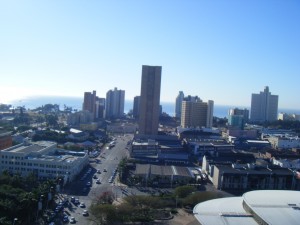I am an avid traveler and like most travelers, I enjoy taking photos of the places I visit as a reminder of what I saw and experienced. When I returned from a trip to South Africa, a friend remarked that she was surprised because my pictures didn’t look like they were of “Africa.” There were two things that caught me off guard by that statement. First, what is Africa supposed to look like and secondly, what part of “Africa” is she referring to.
Of course I say this already knowing the answer. She expected some safari image, swollen bellied babies and thatch-roofed huts. Instead, she saw my pictures outside a Westin in the middle of high rises in downtown Cape Town or with friends in Soweto outside their middle class home, that easily could have been in any city in America. She saw my picture on North Beach in Durban and wondered if I was in Los Angeles or Miami.
Don’t get bogged down with precise descriptions. Africa is big: fifty-four countries, 900 million people who are too busy starving and dying and warring and emigrating to read your book.
~ excerpt from Binyavanga Wainana’s,“How to Write About Africa”
We could blame the media, but we have to also hold ourselves accountable. Chimamanda Ngozi Adichie and many others have warned of the danger of the Single Story. And anyone that has read Binyavanga Wainana’s,“How to Write About Africa” and How to Write About Africa: The Revenge, is probably more conscious of the way they write about the continent. But what about travelers, who often serve as a source for first hand accounts within the United States, of many other places around the globe, .
When you travel, volunteer internationally or study abroad you become an ambassador to your friends and family for places they may never see. In this role, you have several methods you can use to help people understand your experience in the destination. You can “other” the destination and individuals; emphasizing what makes them so different from you and downplaying the richness and diversity of the destination. You can over generalize and use your one-week trip to one small or even large town as a representation of an entire country or even worst a continent. Or you can tell a larger and more accurate story that shows not only the differences and uniqueness but also the similarities. For to not share images of advancement, diversity and similarity is to almost tell a small white lie about the place. You can also share your travel tales, as truly only small first person accounts, emphasizing that you only experienced a small portion of what the destination had to offer.
Though some of your friends and family may do additional research into the destination, your explanation and images will often be the only way they will tell others about your trip. This multiplying effect makes your account so much more powerful than you might think.
It is important to avoid generalizations, single stories and one-dimensional tales. And most importantly when you visit regions and continents continually state the cities, country or region you visited rather than saying I had a wonderful trip to “Africa, the Caribbean or Latin America”. As always think how your pictures, stories or videos would fit into a tale of a visitor to your own town. If someone visited Canada or Mexico you would not assume that visit told him or her everything about Tucson, Atlanta or New York. Or if you visited these cities, you would not assume you now had experienced Los Angeles. But people do it all the time when they visit areas in places like Ghana, Thailand, Colombia or Jamaica, for example. The differences between cities within this country are no different than those in any other country. Be honest in your travel tales, and remind people that you only visited a small place and can only speak for your personal experience. You are now an ambassador for that destination, whether you like it or not, and your stories become part of the truth that people use to inform their understanding of the world.



